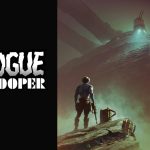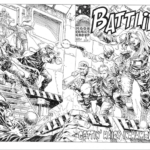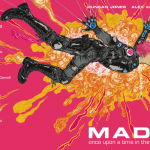One of the many exciting aspects of MUTE is the return of Clint Mansell to score the spiritual sequel to MOON. A new collaboration between Duncan Jones and Clint Mansell after the stunning score to MOON just makes the ears dribble with anticipation (or maybe I need to see a Doctor). Clint has been sharing some thoughts and inspirations for his Mute score over on Instagram which he was kind enough to allow us to share with you on here too, so without further ado, it’s over to Clint…
Posted on Instagram Feb 7th 2018
Mute, the new film by Duncan Jones, & scored by me, is coming to Netflix Feb 23.
One of my favourite things about scoring film is the myriad of ideas the story, it’s setting, it’s style will bring to me. The film as muse. This can often result in a lot of dead ends while I’m deciphering what the film is telling me it needs but, if I pay close enough attention, it will reveal itself to me.
In an ongoing sequence until the film release(or I/you get bored ?)I’ll post some of the happy trails and odd diversions I took in search of the score for Mute.
Posted on Instagram Feb 14th 2018
The road to Mute music is paved with the beautiful chaos of poets and artists, musicians and philosophers, dreamers and drunks, lovers and the lost and lonely, the wild, the beautiful, and the damned. And I bet they all thought Valentines Day sucks!? Presented with an opportunity to write music for Duncan’s latest film, Mute set in a near future Berlin, is a mouthwatering prospect. Berlin has been, and continues to be, a cultural hot bed of our times. From the 1920/30s of Sally Bowles & Christopher Isherwood, the devastation of both World Wars, the separation caused by the Wall, the birth of a new German culture through kosmische music created across the country that rejected rock & roll to forge a new identity, alongside the new German cinema, the industrial deconstruction of the 1980s, the techno of Tresor, to the sonic beauty of @erasedtapesrecords… I mean, it’s an incredible pallet to draw upon-and a somewhat daunting to dare to think oneself even worthy of mentioning these great artists in the context of my own work.
But hey, ‘fortune favours the brave’ and all that, so let’s go!
Watch this space for some of the artists of all mediums that inspired me to create a musical universe to complement the world of Mute
- Popol Vuh
- The Adverts
- Neu!
- Christiane F
- Tony Conrad
- William Burroughs
- Hansa By The Wall
- Einstürzende Neubauten
- The Warriors
- Suicide
- Ultravox
- John Foxx
- Wim Wenders
- Gustave Doré
- Linder Sterling
- Mute Records
- Robert Rental & The Normal
- Low
- The Idiot
- Stasi
Not all Berlin related but they all helped me on the pathway to the music for Mute.
Also watch for the Spotify playlist to blast after your Mute screening party on Feb 23??
Posted on Instagram Feb 16th 2018
When starting work on a new project I love to get ‘underneath the hood’, as it were, and immerse myself in whatever I can find that has resonance with what the film is presenting to me.
Of course, the film itself is the guiding force, the one who must be obeyed. Everything is done in service of the film. You can’t just shoehorn into it whatever takes your fancy.
Thats why I like to have enough time on a project to absorb it completely.
I love doing background research on a project, and often that search will lead nowhere but thats OK, because at that point I’m dismissing ideas that don’t encompass what we’re looking for.
I wouldn’t want you to think that anything I reference here is indicative of what you’ll see or hear in Mute. Think of this as a mood board, a vibe that will bounce around me as I’m absorbing the film, the story, the characters. Ultimately, the music develops from disparate influences but is guided by the film and it’s director.
I’ve found that film will reject music that it doesn’t want so the film itself is the key ingredient and will tell you what it needs. It’s my job to listen and deliver.
Also, when doing this research it can often be nothing specific that I’m looking for-it might just be a mindset. For instance, I doubt theres anything in the score for Mute that sounds like Einsturzende Neubaten (though the tubulum that The Jerry played for us may be a distant relative) but that doesn’t mean they weren’t an influence-the Neubaten philosophy is as bold as their music and to listen to them, read about them, opens the mind in ways that I might not have considered. Berlin, though, as a resource is unbelievably fertile. Any one one of the areas I mention here will not do it justice but the knowledge is out there so go dig if something tickles your fancy.
For instance, German Expressionism. And, particularly in relation to Mute, Metropolis. World-building, future leaning, but with its roots in the present. To me, there is no better guide to the future than looking at the past. Metropolis was made between the two wars but it envisaged a future society, prior to Hitler taking control with the Reichstag Fire Decree and the Enabling Act thus ending democracy and starting the nazi era. Sadly, something which is starting to feel eerily familiar today.
German Expressionism laid ground for many genres of filmmaking-some of which were definitely useful to me for Mute. The sci-fi of Metropolis, directed by Fritz Lang who would also direct crime dramas like M, and moved into film noir, another touchstone for Mute, with The Big Heat & While The City Sleeps. From there we get to other great film directors such as Billy Wilder. Double Indemnity is still one of my favourite films.
Film noir is such a rich genre, from Humphrey Bogart ‘In A Lonely Place’, directed by Nicholas Ray (who would direct James Dean in ‘Rebel Without A Cause’), to Cape Fear (1962), starring Robert Mitchum and Gregory Peck, with its amazing Bernard Hermann score (do a youtube search for ‘Darkcore Jungle DJ Harry & Point Blank – Cape Fear (DJ Harry Mix)’ for an awesome drum and bass lift of the title theme that still makes this old man tap his toe!) Cape Fear was directed by J.Lee Thompson who had directed the great British noir ‘Yield To The Night’ starring the incredible Diana Dors.
Once you think of Bob Mitchum though you can’t help but go to Night Of The Hunter. With ‘love and hate tattooed across the knuckles of his hands’ as the Clash (unrelatedly) put it. Though not so much a film noir, an amazing movie in its own right, and the only one Charles Laughton would direct. Contemporary film noir has given us such classics as Chinatown, Brick, & Blood Simple. A seriously rich vein of inspiration.
The Weimar era also gave us Cabaret and Sally Bowles. Based on Christopher Isherwood ‘Goodbye To Berlin’. It shows an end to the decadent freedom of expression which caused so many filmmakers and artists to flee Berlin before the second World War. Not entirely film noir, but related, is The Man With The Golden Arm. Starring Frank Sinatra as a junkie drummer (named Frankie Machine-what a name!), directed by Otto Preminger, and with an incredible score by Elmer Bernstein. The theme was covered by Barry Adamson on his superb Moss Side Story album. Both are worth your time. Also Howard Chaykins Black Kiss graphic comic novel,humorous, decadent, & proper naughty adds a vein of irreverence that I dig.
So, even in this short exploration of one element of Berlin, you can see how rich the influence is, and how it has many branches leading to a myriad of other equally inspiring creations. Its not even so much that I would use any specific reference, its more about getting the juices flowing. Of course, the film itself brings this in massive doses. I hope the research I do helps me to find an opening, a connection, into the world that Duncan is building. So that I can bring something not only complimentary, but also something influenced by, or born out of, the world that informs this new universe we’re creating.
Posted on Instagram Feb 19th 2018
Growing up in England in the 70s, WWII was still hanging heavily over the country. TV was full of war films like 663 Squadron, The Dambusters, and such. The World At War was a documentary TV show that seemed inescapable when you were 10 years old. All these had great theme tunes to them, and Carl Davis ‘World At War’ theme captures that heavy, dark, fear of war to terrifying effect.
So, here’s me, 10 years old, in the Black Country of England having my opinion of Germany shaped for me by the 3 channel TV in the living room. Imagine what growing up in Germany after the war must have been like. The German past was denied, the culture scrubbed from existence, the shame of the Nazi war crimes eradicated national pride and, with it, identity.
Out of those ruins would grow a new culture, new sounds, new ideas, and a new identity.
Kraftwerk have long been considered at the forefront, quite rightly so, but there are many others that added much to this new German revolution. Along with Ralf Hutter and Florian Scneider, are Michael Rother, Klaus Dinger, Hans-Joachim Rodelius,, Dieter Meier, Holger Czukay, Florian Fricke, Edgar Froese and the bands they formed-Neu! Harmonia, Cluster, Popul Vuh, Amon Dull, Can, Tangerine Dream…from a starting point of rejecting American culture that had been brought over by US GIs, they started searching for their own sound. Early Kraftwerk pieces like Kling Klang, Ruckzuck, offer only a little insight into where they might head being a long way from the precision and clarity of their future work. Based around flutes and live instrumentation, produced by the great Conny Plank-who would become a great production force, working with Can, Cluster(& Kluster!), Eno, Ultravox, Killing Joke, to name a few.
My personal favourite is Popul Vuh. Florian Fricke was one of the first musicians to own the Moog III modular synth. He made two laps with it before abandoning electronic music for the most part. He had met a filmmaker called Werner Herzog in 1968 and went on to score or have music involved in about a dozen of Herzog movies-even using Fricke music after his death in 2001. My faves being Aguirre, Wrath of God, and Nosferatu.
I’m not sure when I first saw Aguirre. I thought it was part of Alex Cox excellent Moviedrome series from the late 80s that was essential viewing on the BBC. I did a quick search and it seems it wasn’t part of that series, but it easily could have been. I learned a lot from the films that Alex curated for that series, and in combination with Danny Pearys Cult Movie books gave me great insight into movies that I think instilled a way of seeing movies that is forever ingrained in me. Roger Ebert described the Popul Vuh score for Aguirre saying “The music sets the tone. It is haunting, ecclesiastical, human and yet something else’ Its hypnotic, almost narcoleptic, and awesome! We referenced it when making The Fountain many years after I’d first seen it and i loved the fact that those teenage years watching movies all night had become part of the life I am fortunate to now lead.
While the new music was developing, so was the new German cinema. In 1962, 26 filmmakers had signed what was to be called the Oberhausen Manifesto, which said something like “Papas Kino ist tot” (Papa’s cinema is dead)
“Film needs to be more independent. Free from all usual conventions by the industry. Free from control of commercial partners. Free from the dictation of stakeholders.
We have detailed spiritual, structural, and economic ideas about the production of new German cinema. Together we’re willing to take any risk. Conventional film is dead. We believe in the new film.” – Oberhausen, 28.2.1962
It was a call to make new German films that would educate as well as entertain, and was the starting point for the New German Cinema that would follow later.
From this came the many great films of Herzog. Rainer Werner Fassbinder, most relevant to Mute, with World On A Wire, his only sci-fi film that pre-dates Bladerunner in its themes of AI.
Probably my favorite film from this outpouring is Wim Wenders ‘Wings Of Desire’, or ‘The Heavens Over Berlin’ is how the German title translates.. A beautiful, poetic film, abut an angel who wants to experience being human. I love stories of this nature-Moon, to me, was about what is it to be human? They encapsulate loss, and isolation, and the melancholy of existence. I just melt for this stuff. Capturing Berlin before the fall of the wall, and featuring footage of early Nick Cave and the Bad Seeds performing, and Roland S Howards Crime and the City Solution, and the poetry of Rainer Maria Rilke. Its beautiful. You can feel the end of the 70s and 80s through it. Baader-Meinhof, the Munich Olympics, the separation caused by the Wall, which would fall a couple or so years later. Its a beautiful, poetic document of the city. German culture was reborn from the ruins, and its influence wouldn’t go unnoticed.
Its not possible to mention David Bowie in all of this. ‘Low’ is a record that I return to over and over again. I find it inspiring whenever I hear it. When I’m stuck, when I’m down, when I’m happy, it always brings something to me. That it was recorded in Berlin, at Hansa By The Wall, with Eno, Tony Visconti, alongside Heroes, and ‘The Idiot’-unfair on Iggy Pop to call it a Bowie LP by any other name, but its a big part of an incredibly fertile and creative chapter of Bowies career. Again, its been such a gift that the music of my teenage years has to come to be a huge part of my life. I’m forever grateful to Duncan for inviting me to be a part of this world he’s creating that links all these influences together.
So much great music has been influenced by both german music and films. Ultravox first LP was recorded with Brian Eno, the third with Conny Plank. The influence can be felt throughout those early records particularly with John Foxx on vocals, an intelligent, poetic soul that infused their glam-punk-electronic sound with sci-fi/futurist themes. Joy Division were influenced heavily by the Berlin-era Bowie record. ‘Mass Production’ from The Idiot influences the path that post-punk would take. Suicide, in New York, as well as Afrika Bombatta, would push the kosmiche machine-edge of Kraftwerk in completely different ways.
‘Crossing The Red Sea With The Adverts’ another record that continues to inspire me to this day, captures the leftover war feelings that abounded in the 70s. The beginning of ‘Bombsite Boy’ captures the dark, grey, bombed out wastelands that were common all over Europe for years after the war had ended. TV Smiths lyrical prowess echo’d the cut-up technique that William Burroughs had started, and that David Bowie also employed. Eno, his use of studio as instrument, his Oblique Strategies. Tony Conrad brought his Theatre of the Eternal Music/Dream Syndicate approach to work with Faust.
Tangerine Dream would break out in to film scoring with great work on ’Soreceror’, ‘Miracle Mile’, & ‘Risky Business’ all being must own LPs!
Deutsch Amerikanische Freundschaft, Einsetzende Neubauten, X-Mal Deutschland, would bring the philosophies back to Germany, and Tom Tykwer has added to German cinema with Run Lola Run, Perfume, the current Netflix series, Berlin Babylon, often composing the scores alongside his regular composers Johnny Klimek and Reinhold Heil.
This is a mere dip into these amazing artists, films, and music. The truth is out there if you need more. Again, its an incredible wealth of magic that crashes over me like a wave, bringing ideas, philosophies, and beauty. Mute brought all of these to mind.
All this AND we also have the integration of The Jerry’s Monster Tubulum into the score too! We’ve not heard any of Clint’s score yet (for those wondering the music used in the MUTE trailer is Pilgrimage by Twelve Titans Music which you can listen to in full here). Someone who HAS listened to Clint’s score of course is Duncan, seems pretty pleased if the tweets he sent out during the process are anything to go by 🙂
Me leaving @iamclintmansell's house this morning after hearing some of the @mute soundtrackhttps://t.co/8WjVpwzFgn
— Duncan Jones (@ManMadeMoon) April 28, 2017
Look at all the ? going through that beautiful head! @iamclintmansell @mute pic.twitter.com/dTexMZpJDZ
— Duncan Jones (@ManMadeMoon) May 5, 2017
Ok. I've heard the @Mute score by @iamclintmansell enough times to be able to say it may well be as good as the Moon score.
— Duncan Jones (@ManMadeMoon) July 17, 2017
So, as well as having MUTE itself to look forward to a week from today we also have some of Clint Mansell’s “film nutmeg” to look forward to too.

MUTE premieres Worldwide on Netflix on Friday 23rd February 2018.






